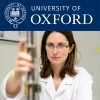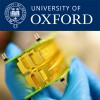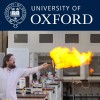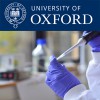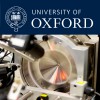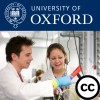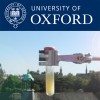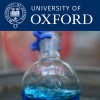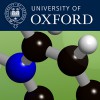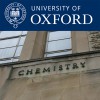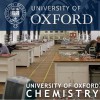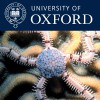Department of Chemistry

Relevant Links
Description: Oxford is one of the leading chemistry departments in the world, offering world-class teaching along with 80+ research groups at the cutting-edge of experimentation, commercialization, and fundamental science. The latest (2008) Research Assessment Exercise confirmed that Oxford Chemistry has the highest “power rating” (breadth and depth of science) in the UK. The Department has played a key role in shaping the modern world, with contributions ranging from the lithium-ion battery to the blood-glucose sensor and from historical breakthroughs in crystallography to the advent of personal medicine with DNA technology. Our researchers are currently engaged in a number of innovative themes of work address and are poised to address global challenges in areas such as healthcare, climate and energy solutions, clean water and food supply, next-generation communications, transport and computing. For more information on our research, please visit http://www.chem.ox.ac.uk/researchthemes.asp.
Series associated with Department of Chemistry
| # | Episode Title | Description | People | Date | |
|---|---|---|---|---|---|
| 74 | Search for the Electron EDM Using Molecular Ions | 4th and final lecture in the Hinshelwood 2019 lecture series | Jung Ye | 30 Apr 2019 | |
| 73 | Quantum Matter and Atomic Clocks | 3rd lecture in the Hinshelwood 2019 series | Jun Ye | 30 Apr 2019 | |
| 72 | A Quantum Gas of Polar Molecules | 2nd lecture in the Hinshelwood 2019 series | Jun Ye | 30 Apr 2019 | |
| 71 | General introduction - Control of Light: Frequency Comb Spectroscopy from IR to UXV | 1st lecture in the Hinshelwood 2019 series | Jun Ye | 30 Apr 2019 | |
| 70 | An Outdoor Pause: Skipping Stones, Splashes (and some tea to conclude) | The 6th and final session of the Hinshelwood 2018 chemistry lecture series | Lydéric Bocquet | 20 Sep 2018 | |
| 69 | Ski Friction and the Alchemy of Waxing | The 5th session of the 2018 Hinshelwood lecture series | Lydéric Bocquet | 20 Sep 2018 | |
| 68 | Interfacial Transport: from Colloid Transport to Active Matter | 4th lecture in the 2018 Hinshelwood lecture series delivered by Professor Lydéric Bouquet, Directeur de Recherche, CNRS, and Professor of Physics, Ecole Normale Supérieure, Paris | Lydéric Bocquet | 04 May 2018 | |
| 67 | Playing with Osmosis: Kidney Filtration, Active Sieving and Energy Harvesting | 3rd Lecture in the 2018 Hinshelwood lecture series, with Professor Lyderic Bocquet, Directeur de Recherche, CNRS, and Professor of Physics, Ecole Normale Superieure, Paris | Lydéric Bocquet | 01 May 2018 | |
| 66 | Flows at Nanoscales, from Exotic Transport to Ionic Machines | 2nd lecture in the 2018 Hinshelwood lecture series delivered by Professor Lyderic Bouquet, Directeur de Recherche, CNRS, and Professor of Physics, Ecole Normale Superieure, Paris | Lydéric Bocquet | 01 May 2018 | |
| 65 | General introduction: Soft Interfaces and Scales Slippery Roads of Hydrodynamic Slippage | 1st Lecture in the 2018 Hinshelwood lecture series, with Professor Lyderic Bocquet, Directeur de Recherche, CNRS, and Professor of Physics, Ecole Normale Superieure, Paris. | Lydéric Bocquet | 30 Apr 2018 | |
| 64 | The enzymology of thiamin (vitamin B1) metabolism: biosynthesis, degradation and a thiamin-based antimetabolite. | Professor Tadhg Begley, Texas A and M University delivers the 2017 Newton Abraham Lecture. | Tadhg Begley, Rajesh Thakker | 19 Sep 2017 | |
| 63 | Lecture 6: Bioinspired Colloidal Assembly: From Photonics to Encryption | The sixth lecture in the Hinshelwood lecture series. | Joanna Aizenberg | 18 May 2017 | |
| 62 | Lecture 5: Everything SLIPS: A New Concept in Anti-biofouling Materials | The fifth lecture in the Hinshelwood lecture series | Joanna Aizenberg | 18 May 2017 | |
| 61 | Lecture 4: Hydrophobicity, Superhydrophobicity, Omniphobicity and Slippery Surfaces | The fourth lecture in the Hinshelwood lecture series | Joanna Aizenberg | 18 May 2017 | |
| 60 | Lecture 3: Actuated "spiny" Surfaces a la Echinoderms: En Route for Adaptive Materials | The third lecture in the Hinshelwood lecture series. | Joanna Aizenberg | 18 May 2017 | |
| 59 | Lecture 2: Rationally Designed Complex 3D Microarchitectures | The second lecture in the Hinshelwood lecture series | Joanna Aizenberg | 18 May 2017 | |
| 58 | Lecture 1: Bio-inspired approaches to crystal design | The first lecture in the Hinshelwood lecture series. | Joanna Aizenberg | 18 May 2017 | |
| 57 | Creative Commons | Unlocking the Power of Hydrogen | Kylie Vincent and Philip Ash discuss how bacteria harness the energy stored within hydrogen molecules, and how this could help build a more sustainable energy future. | Kylie Vincent, Philip Ash | 10 Jun 2015 |
| 56 | Creative Commons | Chemistry is Central to our Energy Future | Phil Grunewald, Deputy Director of Energy Research at the University of Oxford, explains how chemistry helps to solve global energy challenges. | Phil Grunewald | 10 Jun 2015 |
| 55 | Creative Commons | Nanoparticle Catalysis: Size Matters | Hanif Mahadi, Researcher in Edman Tsang’s group, explains how nanoparticle catalysts help us use fossil fuels more efficiently and develop cleaner alternative sources of energy. | Hanif Mahadi | 10 Jun 2015 |
| 54 | Creative Commons | Using Catalysts to Make Exhaust Fumes Greener | How can we reduce the pollution from car exhausts? | Elizabeth Raine | 10 Jun 2015 |
| 53 | Creative Commons | The Energy Challenge: Research at Oxford | Providing secure, affordable and sustainable forms of energy is one of our biggest challenges this century. Hear how the cutting-edge fundamental research we undertake addresses real world problems and helps us to move towards a more sustainable future. | Phil Grunewald | 10 Jun 2015 |
| 52 | How can eating chocolate teach us about chemistry? Celebrating the Year of Crystallography | A film produced as part of the Oxford Open Doors 2014 which examines some interesting research at Oxford Chemistry with some thoughts from the general public. | Chris Schofield, Richard Cooper, Charlotte Richards | 16 Jan 2015 | |
| 51 | Can we starve tumours? Oxford Chemistry joins Cancer Research UK in the fight for the cure | A film produced as part of the Oxford Open Doors 2014, reflecting on some of the exciting cancer research being undertaken in the Oxford Chemistry Department. With Professor Chris Schofield, Oxford University, and Charlotte Richards, Cancer Research UK. | Chris Schofield, Charlotte Richards | 16 Jan 2015 | |
| 50 | X-Ray crystallography: revealing the shape of molecules | Dr Richard Cooper on x-ray crystallography - an incredibly powerful technique for determining the 3D structure of crystals. | Richard Cooper | 23 Jun 2014 | |
| 49 | The Zeeman Decelerator and ultracold chemistry | The Zeeman Deceleator is used to do ‘ultracold chemistry’ – slowing down molecules in order to study reactions. Katrin Dulitz shows off her amazing machine. | Katrin Dulitz | 19 Jun 2014 | |
| 48 | Incredible Machines: Conclusion | Dr Ashley Shepherd concludes the Incredible Machines series by explaining what makes her the most excited about working as a scientist in the Department of Chemistry. | Ashley Shepherd | 19 Jun 2014 | |
| 47 | Mass spectrometry: how does it work, and why should you care? | From cutting-edge cancer research to sustainable fish farming, Dr James McCullagh explains the importance of mass spectrometry. | James McCullagh | 19 Jun 2014 | |
| 46 | Glassblowing: a beautiful, crucial, trade | Watch glassblower Terri Adams in action as she creates scientific tools from the flames. | Terri Adams | 19 Jun 2014 | |
| 45 | Inside NMR Spectroscopy | Dr Tim Claridge takes apart an NMR machine to show us how this technique is used in research with application in human health and beyond. | Tim Claridge | 19 Jun 2014 | |
| 44 | The Stark Decelerator & ultracold chemistry | The Stark Decelerator was built from scratch in the basement of the Chemistry Department. Dr Brianna Heazelwood shows how this incredible device is used to study molecules. | Brianna Heazlewood | 19 Jun 2014 | |
| 43 | Incredible Machines: Introduction | Dr Ashley Shepherd introduces the extraordinary machines used by Oxford chemists, and tells us about her work as a surface analyst. | Ashley Shepherd | 19 Jun 2014 | |
| 42 | Meet the Scientists - DNA Synthesis | Angelina Measures, DPhil student in the Conway Group, Oxford, synthesises small molecules to study how our DNA is stored and used. Angelina discusses the unique practical skills gained from a chemistry degree, and shares what she loves about research. | Angelina Measures | 11 Apr 2014 | |
| 41 | Meet the Scientists - Collaborations with the Oxford Botanic Garden | Alison Foster, Senior Curator of the Oxford Botanic Garden, discusses her daily work and the transition she has made from working in a lab to working in the garden. | Alison Foster | 09 Oct 2013 | |
| 40 | Meet the Scientists - Solar Fuels and Artificial Photosynthesis | Andreas Bachmeier, a DPhil student in the Armstrong Group, Oxford University, gives a glimpse into his research and his life outside of work, including a love for rowing and German beer. | Andreas Bachmeier | 09 Oct 2013 | |
| 39 | Meet the Scientists - Transparent Conductors | Alex T. Vai, DPhil student in the Donohoe Group, University of Oxford, describes his exciting research into touch-screen technology and also tells of his outside work ventures in orienteering and orchestra. | Alex T. Vai | 04 Oct 2013 | |
| 38 | Meet the Scientists - Solar Fuels, Bacteria and Hydrogen | Dr Rhiannon Evans from the Armstrong Group, University of Oxford, gives a short account of her research studies into solar fuels, as well as giving an insight to her life outside of research. | Rhiannon Evans | 04 Oct 2013 | |
| 37 | Meet the Scientists - Solar Fuels and Enzymes | Susannah Hexter, DPhil Student in the Armstrong Group, University of Oxford, describes her love for Chemistry and discusses her hobbies outside of work. | Susannah Hexter | 04 Oct 2013 | |
| 36 | Conclusion: How Chemistry Research Impacts Human Health | Wrapping up this series on human health, Dr Emily Flashman talks about her work studying the mechanisms by which our bodies respond to low levels of oxygen. | Emily Flashman | 19 Jul 2013 | |
| 35 | Practical Uses of NMR: Exploring Enzymes to Fight Disease | The mutant enzymes that cause disease in our bodies can be combated by chemical inhibitors if we understand how these molecules are interacting. | Ivanhoe Leung | 19 Jul 2013 | |
| 34 | Lasers, Cell Membranes, and the Basis of Life | Being a chemist doesn't have to mean giving up on biology and physics. | Mark Wallace, Matt Baker | 19 Jul 2013 | |
| 33 | Synthesizing Anti-Cancer Drugs from Nature | Chemicals found in nature can have incredibly useful functionality, including anti-malarial and anti-cancer properties. However, they are usually found in small amounts. | Chris Jones | 19 Jul 2013 | |
| 32 | 3D Printing and The Structure of Proteins | Using 3D printed molecules, Rok Sekirnik, a DPhil student in the emerging field of chemical biology, shows how protein structures can be determined in some of the Department's most distinctive looking labs. | Rok Sekirnik | 19 Jul 2013 | |
| 31 | Epigenetics and New Anti-Cancer Treatments | At the interface of chemistry, biology, and medicine, Cyrille Thinnes, a DPhil student in the Schofield Group, shares his research into the next generation of anti-cancer treatments. | Cyrille Thinnes | 19 Jul 2013 | |
| 30 | Introduction: How Chemistry Research Impacts Human Health | To truly understand disease, we need to understand the underlying chemical processes that direct human biology. Dr Emily Flashman introduces some of the research in the Department of Chemistry that will help improve our health in future. | Emily Flashman | 19 Jul 2013 | |
| 29 | Conclusion: Inspired by Nature | The current energy crisis is a time of intense challenges but also of opportunities for fantastic science and innovative ideas. | Alex T. Vai | 19 Jul 2013 | |
| 28 | Artificial Photosynthesis - From Photon to Fuel | Andrea Bachmeier, a DPhil student in the Armstrong Group, is helping to create a fully integrated artificial photosynthesis (APS) system which could be much more efficient at turning sunlight into fuel than living systems. | Andreas Bachmeier | 19 Jul 2013 | |
| 27 | Photosynthesis in Nature | Dr Alison Foster, a former chemist and Senior Curator at the University of Oxford Botanic Garden explains the principals of natural photosynthesis that the Armstrong Group is trying to mimic in the lab. | Alison Foster | 19 Jul 2013 | |
| 26 | Enzymes as Fuel Producers | Growing energy demand worldwide is a crucial challenge for chemists. Suzannah Hexter, Armstrong Group, shows how, with the help of enzymes, the principles of photosynthesis may be artificially exploited and improved to provide a clean energy resource. | Suzannah Hexter | 19 Jul 2013 | |
| 25 | Introduction to Solar Fuels | In an 'Oxford tutorial' style podcast, Professor Fraser Armstrong introduces the concept of artificial photosynthesis: coupling a light harvesting material with a fuel producer in order to generate storable energy from sunlight. | Fraser Armstrong | 19 Jul 2013 | |
| 24 | Conclusion: Strange Substances and Structures | Imagine being able to transform an insulating material into an electrical conductor just by touching it with a magnet. | Andrew Goodwin | 18 Jul 2013 | |
| 23 | Crystals, Hydrothermal Bombs, and the Study of Strange Mechanical Properties | Andrew Cairns and Ines Collings, DPhil students in the Goodwin Group, explain how they make single crystals in the lab and study their unusual properties. | Andrew Cairns, Ines Collings | 18 Jul 2013 | |
| 22 | Supercapacitors, Ionic Liquids, and Implications for Sustainable Energy | From smart phones to electric cars, batteries and energy storage devices are vital. Dr Nico Cousens is studying ionic liquid supercapacitors - a next generation technology with the potential to transform energy storage and power the cars of the future. | Nico Cousens | 18 Jul 2013 | |
| 21 | Patent Law | Dr John Fisher (Oriel College, 2001), talks about his role as a patent attorney, and offers advice for students who are considering a similar career. It's all about advocacy! | John Fisher | 17 Jul 2013 | |
| 20 | Science Journalism | Laura Howes (Merton, 2001), a science correspondent for Chemistry World, talks about the ins and out of science journalism in general, and her path to a career with the Royal Society of Chemistry. | Laura Howes | 17 Jul 2013 | |
| 19 | Science Communication at the University of Oxford Botanic Garden | Dr Alison Foster (Jesus College), Senior Curator at the University of Oxford Botanic Garden, talks about her journey from industrial pharmaceutical chemistry research to her current role in horticulture, and offers some tips for major career transitions. | Alison Foster | 17 Jul 2013 | |
| 18 | Industry research and management at Infineum | Dr Martin-Dare Edwards (University College, 1974), Project Director for Infineum UK, talks about transitioning from research to management roles within the chemical industry. | Martin-Dare Edwards | 17 Jul 2013 | |
| 17 | Part 3 - My path to academic success - Asel Sartbaeva | Dr Asel Sartbaeval, a Lecturer at the University of Bath, discusses her path from Kyrgyzstan to Oxford and beyond, and offers some advice on balancing career success with family and relationships. | Asel Sartbaeva | 17 Jul 2013 | |
| 16 | Part 2 - My path to academic success - Ed Anderson | Dr Ed Anderson, a Research Fellow at the University of Oxford gives an overview of his current role, and advice on issues he encountered along the way, including the benefits of a post doctoral position in the USA. | Ed Anderson | 17 Jul 2013 | |
| 15 | Part 1 - My path to academic success - Alison Parkin | Dr Alison Parkin, who has just started her own lab group at the University of York, talks about taking career development step by step, and the importance of both research and teaching in academic careers. | Alison Parkin | 17 Jul 2013 | |
| 14 | What has chemistry ever done for me? Or, how did I get here? | Professor Lesley Yellowlees, the first female President of the Royal Society of Chemistry, talks about the choices she had to make in order to obtain her two dream jobs (and hold them at the same time). | Lesley Yellowlees | 17 Jul 2013 | |
| 13 | Creative Commons | Oxford at Said: A human genome in minutes and what it will mean to you | Oxford Nanopore is a British company, spun out of the University of Oxford in 2005 and founded on the science of Prof Hagan Bayley. It is developing new technology that has the potential to improve greatly the speed and cost of DNA sequencing. | Hagan Bayley | 25 Mar 2013 |
| 12 | Molecular Gastronomy is Not Molecular Cooking: A Demonstration: Part 2 | Second part of the Molecular Gastronomy is Not Molecular Cooking: A Demonstration special lecture, combining chemistry with cooking. With leading chemist Professor Hervé This and top chef Raymond Blanc OBE. | Hervé This, Raymond Blanc | 22 Dec 2010 | |
| 11 | Molecular Gastronomy is Not Molecular Cooking: A Demonstration: Part 1 | First part of a special Christmas event, with Professor Hervé This; Physical Chemist in the Molecular Gastronomy Group at the Chemistry Laboratory of AgroParisTech and Raymond Blanc OBE; renowned chef and owner of Le Manoir aux Quat' Saisons. | Hervé This, Raymond Blanc | 22 Dec 2010 | |
| 10 | Christmas Chemistry Show 2010 | Join chemists Dr Hugh Cartwright and Dr Malcolm Stewart at Oxford University and find out just how much fun chemistry can be. You will be entertained and educated by the sort of chemistry you never get to see at school, baffling, tantalising and LOUD. | Hugh Cartwright, Malcolm Stewart | 18 Dec 2010 | |
| 9 | Chemistry Information Day Talk | A talk about Chemistry, studying at Oxford, the course, admissions and Oxford interviews. | Nick Green | 19 Sep 2008 | |
| 8 | Electrochemistry Research | Professor Richard Compton talks about his research interests, plans and spin-out companies. | Richard Compton | 17 Sep 2008 | |
| 7 | Chemistry at Oxford | Why chemistry will change the world - Interview with former Chairman of Chemistry and Waynflete Professor of Chemistry: Professor S.G. Davies. | Steve Davies | 11 Sep 2008 | |
| 6 | Science at Oxford in the 17th Century: Boyle, Hooke and others | Dr. Allan Chapman lectures at the Sutton Trust Chemistry Summer School, a week long workshop featuring chemistry lectures and lab work. | Allan Chapman | 02 May 2008 | |
| 5 | The Worlds Smallest Crystals | Prof. Malcolm Green lectures at the Sutton Trust Chemistry Summer School, a week long workshop featuring chemistry lectures and lab work. | Malcolm Green | 02 May 2008 | |
| 4 | From Solomon to Marangoni: Surface Tension Effects in Chemistry | Dr. Colin Bain lectures at the Sutton Trust Chemistry Summer School, a week long workshop featuring chemistry lectures and lab work. | Colin Bain | 02 May 2008 | |
| 3 | Animal Magnetism | Prof. Peter Hore lectures at the Sutton Trust Chemistry Summer School, a week long workshop featuring chemistry lectures and lab work. | Peter Hore | 02 May 2008 | |
| 2 | Computer Aided Drug Design | Prof. Graham Richards lectures at the Sutton Trust Chemistry Summer School, a week long workshop featuring chemistry lectures and lab work. | Graham Richards | 24 Apr 2008 | |
| 1 | Entertaining Chemistry | Dr. Hugh Cartwright gives his chemistry demonstrations at the Sutton Trust Chemistry Summer School, a week long workshop featuring chemistry lectures and lab work. | Hugh Cartwright | 22 Apr 2008 |

